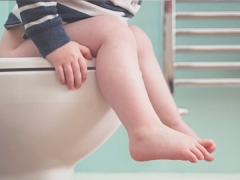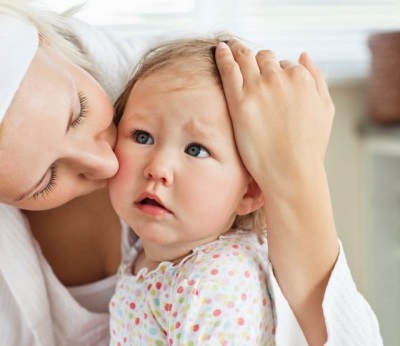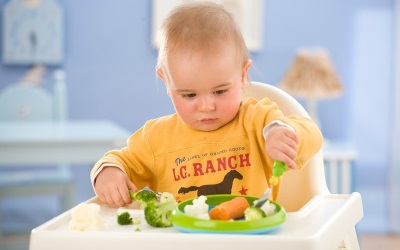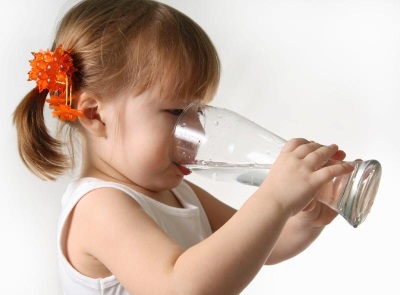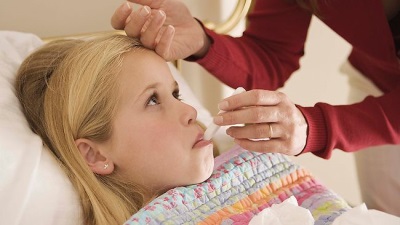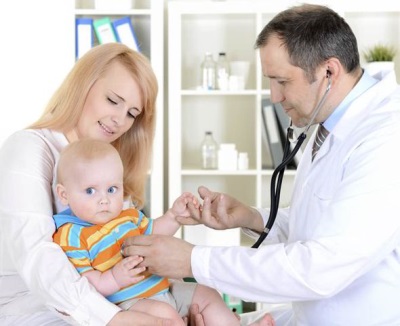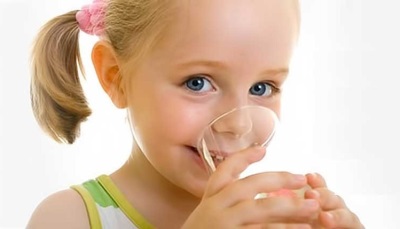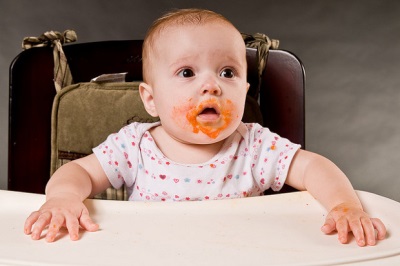Symptoms and causes of diarrhea in children, what to do with diarrhea?
Diarrhea is a fairly frequent problem that parents have to solve. Since the children's intestines are unstable, the dilution of the child’s stool can be caused even by factors harmless to an adult. However, often a liquid stool can manifest a serious illness, and prolonged diarrhea threatens to weaken the child and dehydration. Why does a child have diarrhea and what should parents do?
Symptoms
If a child under one year old has a stool several times a day and in the form of a slurry (if the baby is breastfed), then in older children the digestion is more like the work of an adult organism. Large children are emptied every day or every other day, and their chair is decorated (often sausage).
In diarrhea, the child is emptied very often, his stools are soft or liquid, often with an unpleasant odor. Emptying can be painful, and the anus often becomes inflamed. Abdominal pain, vomiting, fever can join the speeded up chair.
The foaminess of the feces usually indicates an infection. A greenish stool can be affected by staphylococcus, and a marsh hue is caused by salmonellosis. White diarrhea can be a symptom of hepatitis, and the mucous calories of crimson are indicative of dysentery.
The reasons
The main factor in the occurrence of diarrhea is inflammation or irritation of the intestinal mucosa.
The following causes can cause diarrhea:
- Bacterial, fungal or viral infection.
- Infectious diseases (measles, flu and others).
- Sunstroke.
- Parasitic invasion.
- Overeating (often fatty or sugary foods).
- Eating spoiled food, unripe fruits, unusual dishes.
- Nervous excitement
- Intolerance to certain foods.
Frequent development of diarrhea in children is associated with the peculiarities of the structure and work of the digestive tract in childhood. The child’s intestines are longer and have a greater absorption area, so all substances (both beneficial and toxins) from it enter the bloodstream more quickly and to a greater extent than in adults. As a result of infection and inflammation of the mucous membrane, the processes of digestion are disturbed, the intestinal contents are rapidly removed from it.
The most frequent causative agents of intestinal infection are rotaviruses, E. coli, Salmonella, enteroviruses, staphylococcus, shigella. The child is infected through dirty hands, contaminated objects, water, in contact with a sick person.
Products causing diarrhea
Diarrhea can begin after consuming the following foods:
- Fried food. These are products with a large amount of animal fats, fatty meats, desserts with butter, fatty sauces.
- Citrus (oranges, grapefruits).
- Sweeteners (in particular, sorbitol).
- Foods that are high in fiber are vegetables, whole grains.
- Beans
- White cabbage, broccoli, red cabbage and other cruciferous, especially raw.
- Foods with a large amount of fructose are juices, pastries, sweets, carbonated drinks.
- Spicy dishes.
- Chocolate.
- Dairy products (only in the presence of intolerance).
What is dangerous?
First of all, the danger of diarrhea is associated with the deprivation of the body of water and mineral salts. These losses are especially dangerous for children, since in childhood dehydration develops quite quickly.
In order to see the dehydration of the child in time, you need to constantly check his skin and mucous membranes - they will dry out and crack. Also, in this state, the child will be sluggish, drowsy, with dark circles under the eyes. The urine of the child darkens and is released in much smaller quantities. All these signs should be alarming bells for parents.
Non-infectious long-term diarrhea leads to nutritional deficiencies, weight loss, weakness, and beriberi.
The required amount of fluid
The most optimal liquid for diarrhea is a solution that is prepared from pharmaceutical mixtures of salts. If it is not possible to give the baby pharmaceutical salt preparations, make the solution yourself, adding 1/2 teaspoon of salt and three to four teaspoons of glucose to 500 ml of water. This mixture should be given in small portions every ten minutes.
The child should be given per day this amount of fluid:
- At the age of one year (weight up to 10 kg) - from 400 to 700 ml.
- At the age of one to two years - from 700 to 900 ml.
- At the age of two to five years - from 900 to 1400 ml.
Related symptoms
Usually, along with changes in the stool, the parents notice other symptoms in the child.
Temperature
Increased body temperature with diarrhea characteristic of both intestinal infections and food poisoning. The child sweats, weakens, refuses to eat.
If the child also complains of abdominal pain at elevated temperature and loose stools, it is necessary to exclude appendicitis, bowel obstruction, cholecystitis and other surgical pathologies.
Temperature and vomiting
Attacks of vomiting, fever, loose stools - these symptoms usually recognize an intestinal infection or food poisoning. The child complains of nausea, abdominal pain, constant urge to empty.
Also, vomiting, liquefied stools and bloating are characteristic of dyspepsia caused by overeating, eating large amounts of fruit or new dishes (for example, exotic food during the trip). The temperature may be normal or rise slightly.
With blood
The presence of blood impurities in the baby’s feces may indicate serious colon diseases (such as Crohn’s disease or ulcerative colitis). Read more in the article about diarrhea with blood in children.
Diarrhea without fever and vomiting
Frequent episodes of loose stools without worsening the general condition most likely indicate problems with the digestion of food. In this case, diarrhea can be caused by a lack of certain enzymes, an imbalance of beneficial and pathogenic microorganisms in the intestine, and individual intolerance to food. Such a chair is not only liquefied and smells unpleasant, but can also include undigested food, foam, greens.
Liquid unpleasant-smelling stool, which looks fat in appearance, is characteristic of cystic fibrosis.
What to do?
Treat diarrhea caused by malnutrition, if it is not very frequent, parents can do it themselves. It is best to temporarily not give the child food, not forgetting to give a lot to drink.
If you can not determine the cause of diarrhea, and the child's condition worsens, immediately consult a doctor. The child’s stool specimen should be retained until the doctor arrives.
When should I call a doctor?
Often, diarrhea helps to cleanse the body of a child from harmful substances. So first it is worth helping the kid with this. If the liquid stool is observed in a child several times a day and the condition as a whole improves, there is no reason to worry.
Call a doctor in the following cases:
- The child has a chair more than 7-8 times, emptying abundant, watery.
- The child refuses to drink and eat.
- Diarrhea lasts longer than 3 days.
- There are blood impurities in feces.
- The body temperature of the child rose above 38 degrees.
- The baby’s skin is dry or wrinkled, the color of urine has darkened.
- Diarrhea began after eating mushrooms.
- The child complains of severe abdominal pain.
- Diarrhea appeared in other family members.
- The skin and eyes with the onset of diarrhea became yellow.
- The child had a rash.
- Diarrhea does not appear the first time and the child began to lose weight.
You will need to tell the doctor that the child has eaten in the past two days, if he has not traveled, or if there have been such cases of diarrhea before.
Urgent Care
While the doctor has not arrived yet, parents cannot hesitate - they have to correct the food and fill up the liquid lost by the child due to diarrhea:
- With a weak form, give the child a lot of drink. The child should drink after each visit to the toilet. If the liquid you drink has caused vomiting, you should drink another portion, but in small sips and with pauses. But food should be limited.
- In severe form, a large volume of drink should also be provided to the child. Recommended bed rest, a special diet and a doctor's call if the chair does not begin to normalize in two days.
Add electrolytes to the water - so the body will restore the minerals it needs much faster.
Antidiarrheal drugs
If the state of health is worsened, bed rest is recommended for the child.
Home methods
Make your baby sit a warm bath for 10 minutes several times during the day. Such a bath will speed recovery. After the procedure, the child must be wiped and put to bed.
Natural remedies
These include teas, fruits, berries and vegetables to help get rid of diarrhea.
You can give a child:
- Blueberries - dried or canned, as well as in the form of juice or tea. Berries should be given in small portions. To make blueberry tea, 1.5 teaspoons of berries, pour 150 ml of water, boil, boil for 10 minutes, and after straining, give the child.
- Tea from dried raspberry leaves. Pour a tablespoon of raw materials into a cup of boiling water and cover with a lid. Strain the drink for five minutes and give it to the baby.
- Black currant. Its berries have a beneficial effect on the intestines due to vitamin C and tannin. It is best to give the child the juice from this berry 6-7 times a day. It is advisable to drink blackcurrant juice instead of meals, then diarrhea will end very quickly.
- Carrot. It benefits from diarrhea due to the content of fiber and pectin (they help to bind the liquid), as well as vitamin A (promotes healing of the mucous membrane). You can make the child a carrot diet for 1-2 days, without eating at this time other food. Grated boiled carrots give the child small meals every 2 hours. To improve the taste, it is allowed to add mashed potatoes to boiled carrots.
Honey. drugs
It is not recommended to give them to the child before the arrival of the doctor, so as not to prevent the specialist from making the correct diagnosis. In addition, the main therapy for diarrhea is to ensure the availability of the right amount of salt and water in the body. Any additional drugs can not replace these actions. Parents only need to give the child an antipyretic if diarrhea is accompanied by high fever.
- Enterosorbents. The child can be given activated carbon, filtrum, enterosgel and similar drugs. These drugs absorb harmful bacteria, toxins and viruses, cleansing their children's body. It is not recommended to exceed the dosage of sorbents, and also to take them together with other medications (there should be at least an hour between the doses of the enterosorbent and the other drug).
- Zinc. Studies have confirmed the effectiveness of zinc compounds in diarrhea. Drugs containing zinc, facilitate the course of diarrhea in children and reduce the duration of diarrhea.
- Probiotics, prebiotics. These drugs are designed to restore the microflora in the colon. The effectiveness of the influence of lactobacilli and bifidobacteria on the course of acute bacterial or viral diarrhea has also been proven by studies. Probiotics are especially effective if diarrhea has developed, as a result of the use of antibiotics.
- Other medicines. The doctor may prescribe enzymes to improve digestion, as well as antispasmodics, if the child complains of cramping pain.
In severe cases, it is possible to prescribe antidiarrheal drugs. They are prescribed only for children over 6 years old. Since they are contraindicated in some diseases of the intestines, it is impossible to give such medicines without consulting a doctor.
Also, after making a diagnosis, the pediatrician may prescribe antibiotics, anthelmintic drugs, anti-fungal medications, antiviral medication. The feasibility of such drugs should be determined by a specialist. Their independent use may affect the health of the child, cause complications or cause the emergence of resistance of microorganisms. In addition, for many infections, it makes no sense to prescribe such drugs - their danger to the child is higher than the expected effect.
